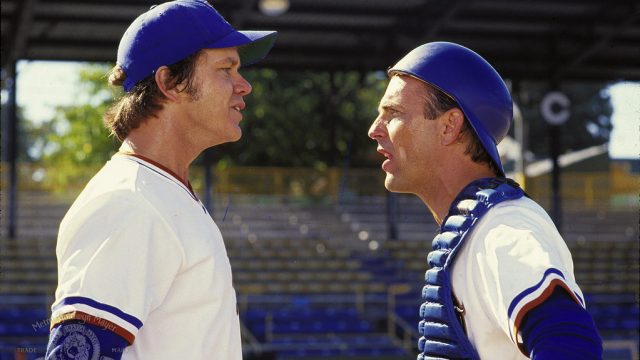The modern romantic comedy has roots going back to Annie Hall in 1977, but it’s really a run of three movies from consecutive years in the late ’80s that codified the genre: 1987’s Broadcast News, 1988’s Bull Durham, and 1989’s When Harry Met Sally… Broadcast News and Bull Durham, in particular, are thematic and stylistic siblings. Both feature a love triangle between a smart but cynical veteran, a quirky true believer from the American South, and a dumb but ambitious himbo; both rely on a whip-smart script; and both were written and directed by men with a deep understanding of the ins and outs of their respective milieus.
But Broadcast News has a persistent prickliness that Bull Durham lacks. Part of this is inherent in their premises — it’s easier to be pessimistic about the state of news media than about America’s Pasttime. Bull Durham is still remarkably realistic about the sport, however. In the smartest decision in a smart script, writer-director (and former minor league baseball player himself) Ron Shelton sets the film squarely in the realm of the minor leagues. This allows him to have his cake and eat it too — Bull Durham is clear-eyed about what it means to be a professional baseball player, while also indulging in the romanticism inherent in baseball movies. For every scene like the one where Crash Davis (Kevin Costner, at his best and most charismatic) floods a rival baseball field to give his teammates a rain day, there’s another like the one where team manager Joe Riggins (Trey Wilson) has to painfully fire Bobby (David Neidorf), effectively ending his baseball career.
The relationship between Crash and talented but dim-witted rookie Ebby Calvin “Nuke” Laloosh (Tim Robbins, in his breakthrough role) provides the movie’s comic engine. Crash has been brought in to train Laloosh, who has a real shot at the Majors but lacks consistency and focus. Early in the movie, both men are brought home by Annie Savoy (Susan Sarandon, amazing), who tells them that she sleeps with one player a season and offers them the choice. Laloosh is only too eager to take her up on the offer, while Crash leaves, indignant. But he can’t get her out of his head. What’s interesting about the way Shelton frames this relationship is that there’s never a game of one-upsmanship or a genuine rivalry between Crash and Nuke — no escalating prank war, no Annie-related friction. Their main source of tension comes from the field, where Crash tries to teach Laloosh how to play with grace. Without calling attention to itself, Crash’s lessons have hidden depths. For instance, when he’s teaching Laloosh how to answer interview questions, he’s also trying to teach him, through his answers, that baseball is a team sport and no man carries a whole team.
While the script has been rightfully praised, there’s also a lot of smart, subtle filmmaking from Shelton. In the opening scene, as the credits roll and Annie opines about the “Church of Baseball” in voiceover, the camera follows her walking the streets of Durham into the town’s baseball stadium, and the effect is electric; we instantly understand the characters’ devotion to the sport, because the stadium seems like the most exciting place in the world in that moment. When Laloosh is pitching or Crash is at the bat, Shelton gets into their heads through handheld closeups, contrasting their thought processes by having Costner use voiceover while Robbins says what he’s thinking out loud.
Bull Durham kicked off an unofficial trilogy of Kevin Costner baseball movies, but with respect to both of them, neither was able to match what he did here. Field of Dreams leaned too hard on the schmaltz and the romance in For Love of the Game never gels with the baseball action like it does here. Bull Durham, meanwhile, remains both of its time (boomer classic rock and soul needle drops! More sex scenes than in all of the studio movies of the 2010s combined!) and timeless in its classic Hollywood formula.

